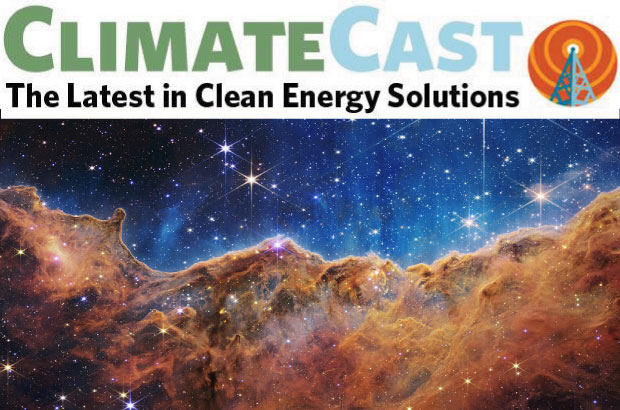Space is the place
One bright spot in this week’s news was quite literal: new images of the cosmos beamed back from the James Webb telescope, alight with stars and the deep, deep universe. It was an incredibly thrilling moment for science and exploration, but it’s not the only significant development from NASA this week. Today, the space agency launched its new imaging spectrometer–Earth Surface Mineral Dust Source Investigation (EMIT)—to measure mineral dusts from our planet’s deserts. Scientists know that the billion metric tons of dust blown from Earth’s deserts every year affects the environment and the climate, but they don’t yet have enough data to determine what those effects are, in the present or in the future. It’s good news for climate science, which is advancing all the time, and will help answer questions about heat waves, intense storms, and other impacts. There’s every reason to expect that better science will only add to the case for urgent climate action.
It’s extra hot everywhere
Summer feels like it finally arrived in the Northwest and typically at ClimateCast, we welcome the summer heat. But summers across the country and the world are becoming more intense and more dangerous. Last weekend another heat dome caused extreme temperatures for over 50 million Americans, with many under the National Weather Service's most severe level of alert--an excessive heat warning. Houston’s record-setting temperatures and soaring power demand for air conditioning is a repeat issue in Texas, and the state’s power grid operator took emergency measures this week to avoid rolling blackouts as soaring electricity demand threatens to outpace available supplies. Western Europe is also bracing for extra hot conditions: Portugal and Spain are already enduring temperatures well above 100 degrees Fahrenheit. Parts of France, Germany, the Netherlands, Belgium and Luxembourg are set to see similar temperatures this weekend. And forecasters warn temperatures in the U.K. could top 104°F for the first time ever.
No news is good news
For most of this year no news on the federal government and climate has been good news. We reported on the Supreme Court’s EPA ruling in the previous ClimateCast, and more stories are coming to light about state and local leadership in light of federal inaction. While climate change has been among the Biden Administration’s top priorities, new polls show Americans divided about how it’s going and Democrats increasingly disappointed. Yet whispers of change are circulating in Washington, with news about a reconciliation bill rising from the ashes of Build Back Better. Still Sen. Joe Manchin may once again dominate airwaves as he continues to block progress on EVs and anything else.
Turns out coal still isn’t going to work
There’s lots to deplore about the Supreme Court’s ruling on the authority of the EPA to regulate emissions, but a 21st century coal revival isn’t one of them. New analysis in the wake of the ruling shows little effect on utilities’ plans to shift away from coal-fired power plants to renewables—already evident in two headlines from Alaska’s closure of its largest coal plant and Hawaii’s closure of its last. Plus the court decision does not directly change any of the EPA’s existing policies or regulations that have also led to recent coal plant retirement announcements, including its coal ash disposal and storage rule.
One Thing You Can Do
Live in Washington? Tomorrow is the last day to comment on Washington State’s groundbreaking and influential Climate Commitment Act. It is now more important than ever for states and local jurisdictions to move decisively to address climate pollution across the economy. With your help, we can ensure the Climate Commitment Act will be transformational in reducing pollution and generating unprecedented levels of investments that will benefit our communities and accelerate clean energy solutions far faster than we would see otherwise. Learn more and take action now.




